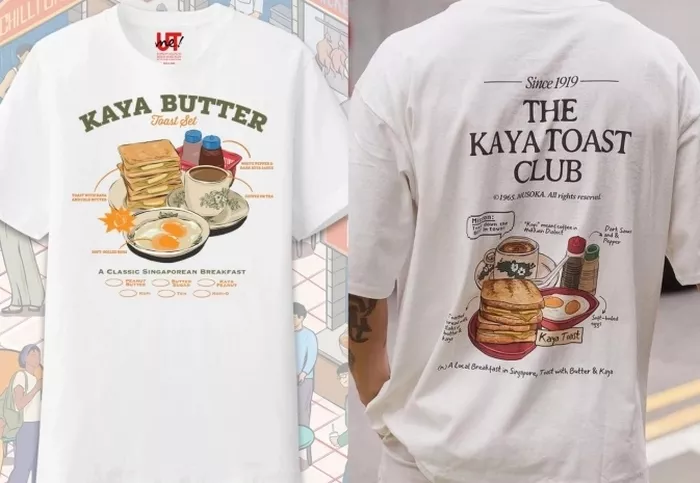Uniqlo’s newly released UTme! Local Delights Collection in Singapore has stirred online debate over alleged similarities to designs by a small local fashion label. The controversy centers on a set of T-shirts inspired by iconic Singaporean dishes, which some claim closely resemble items previously released by Musoka Club.
The collection, launched last Friday, features playful designs highlighting beloved local foods such as 328 Katong Laksa, Song Fa Bak Kut Teh, Hainanese Chicken Rice, Chilli Crab, and the Kaya Butter Toast Set. Each T-shirt retails for S$29.90 (US$23) and features illustrations by local artists Tiffany Lovage and Kenneth Seow. Several of the food brands featured, including 328 Katong Laksa, officially supported the collaboration, according to AsiaOne.
These exclusive T-shirts are available at four Uniqlo locations: Orchard Central Global Flagship, Jewel Changi Airport, VivoCity, and ION Orchard.
However, shortly after the launch, the collection began circulating widely on Instagram, catching the attention of Musoka Club’s 29-year-old founder. Launched in 2020, Musoka Club had released a similar food-themed T-shirt series in July 2023, including designs of the same dishes—and one additional, nasi lemak.
Following the Uniqlo launch, the Musoka Club founder started receiving messages from confused customers asking if her brand had collaborated with the Japanese retailer. Others commented on Uniqlo Singapore’s Instagram teaser, noting that the new designs looked “eerily similar” to Musoka Club’s and calling for respect for original creations.
Digging deeper, the Musoka Club founder noticed that Kenneth Seow—one of Uniqlo’s collaborating artists—follows Musoka Club’s Instagram account. Although she initially avoided speaking out, the resemblance proved difficult to ignore.
“We didn’t want to come off as saying Uniqlo copied us,” she explained in an interview with The Straits Times. “It’s been both heartwarming and painful to watch the public speak up on our behalf while we remained quiet.”
She shared that she had previously faced backlash for calling out another brand and didn’t want to seem confrontational again. Still, she emphasized that the issue is about protecting her original work—not accusing Uniqlo of direct copying.
“When a global brand does something this similar, our original work risks looking like the copy,” she said. “We wanted to show that we didn’t copy someone else.”
In response to the concerns, Uniqlo Singapore issued a statement acknowledging the ongoing public conversation.
“We respect the dialogue it has sparked and remain committed to fostering open, thoughtful engagement within our creative community,” a Uniqlo spokesperson stated. The company emphasized that the T-shirt collection was developed to celebrate Singapore’s rich food heritage in partnership with local artists and well-known eateries.
Uniqlo, which currently operates 28 outlets in Singapore, has gained a strong following among locals. Its signature AIRism oversized T-shirts have become a wardrobe staple, even earning the nickname “SG uniform.” The brand has previously released several Singapore-exclusive items, including collaborative collections with the National Library Board that incorporated themes from local literature.
As the conversation continues, the incident raises larger questions about originality, inspiration, and brand protection in the global fashion landscape—especially when small local labels and global retailers intersect.
Related Topics
- BTN Champions Local Creative Economy at Indonesia Fashion Week 2025
- Ahlgrens Bilar Candy-Inspired Sneakers Make Bold Debut at Stockholm Fashion Week
- Paris Gears Up for Autumn/Winter 2025 Haute Couture Week Amid Major Creative Shifts

